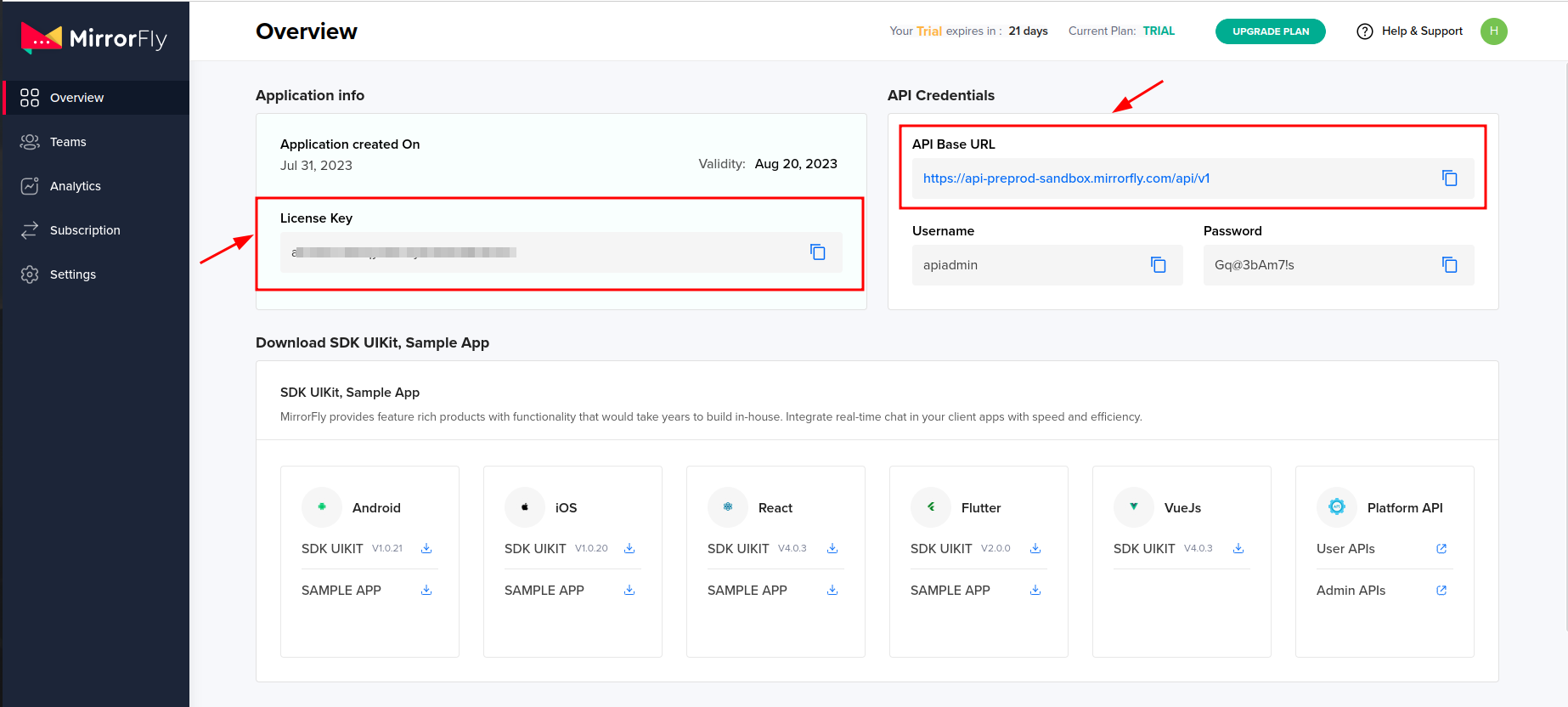Integrate React Native Audio Call SDK for App in 30 Mins
Quick Start#
Call SDKs for React Native#
With CONTUS MirrorFly Call SDK for react native app, you can easily add real-time calls features to your client app within 30 minutes.
note
If you're looking for the fastest way to build your app’s UI with MirrorFly Call SDK, you can use our sample apps. To get our sample apps, click here
Requirements#
The requirements for call SDK for React Native Mobile App are:
React-Native>= 0.73.0 <=0.79.5Node Version>= 18.20.4npm- 10.7.0
Note: If your React Native version is greater than
0.76, ensure the New Architecture is disableafter setup.iOS – To enable/disable New Architecture in
Podfile:Android – To enable/disable New Architecture in
gradle.properties:
Getting Started#
Things To Be Noted Before You Get Started#
SDK License Key#
caution
Skip this part if you are already having your license key.
To integrate MirrorFly Call SDK into your app, you will need a SDK License Key. The MirrorFly server will use this license key to authenticate the SDK in your application.
To get the License Key,#
Step 1: Register here to get a MirrorFly User account. Registration is subject to verification and would take up to 24 hours.
Step 2: Login to your Account
Step 3: Get the License key from the application Info’ section

Integrate Call SDK into Your React Native App#
CONTUS MirrorFly Call for React Natvive, makes the in-app call development process easy with all the essential messaging features
Integrate Using Npm package#
note
Install mirrorfly-reactnative-sdk npm package by using the below command
Step 1: Install Mirrorfly Sdk in your application
Step 2: Import the SDK into your application where you want
Terminology#
The below are the common keywords/terminologies used in SDKs with their descriptions
| Keyword | Description |
|---|---|
userId | Unique ID assigned for each user Ex: 12345678 (any alphanumeric). The below characters is not allowed in userId: U+0022 (") U+0026 (&) U+0027 (') U+002F (/) U+003A (:) U+003C (<) U+003E (>) U+0040 (@) userID should follow below specification: https://xmpp.org/extensions/xep-0106.html |
userJid | userID+@+domain of the chat server Ex. 12345678@xmpp.chatsystem.dev.contus.us |
groupJid | Unique ID assigned for each group Ex: group123456 (any alphanumeric). GroupJID = groupID +@mix.+domain of the chat server Ex: group123456@mix.xmpp.mirrorfly.dev.contus.us` |
Adding NPM package dependencies to integrate the calls SDK#
Add the chat related dependencies as mentioned here. And then add the calls dependencies as given below.
Initialize calls SDK#
To begin with the initialization process of the calls SDK you are required to have certain data that responds to the changes in the connection status in the client's app.
Now, paste the license key on the licensekey param and use the below given method to pass these data through the SDK for further processing.
note
You can find the sandbox server details in the further Sandbox section for testing purposes.
Request Params#
| Arguments | Description | Type | Required |
|---|---|---|---|
| apiBaseUrl | API Base URL for Backend | String | true |
| licenseKey | Mirrorfly's License Key | String | true |
| isTrialLicenseKey | if true Trial Mode will be Enabled | Boolean | false |
| callbackListeners | Check here for callback listerners | Object | true |
Response Params#
| Arguments | Description | Type |
|---|---|---|
| statusCode | Status Code | Number |
| message | Success/Error Message | String |
Sandbox Details#
The apiUrl and licenseKey details can get it from the 'Overview' section in the mirrorfly Console dashboard.

note
To learn more about callback listeners, go to the Callback Event Listener Section.
Example Response#
Create a User#
caution
Skip this part if you are already integrated the register and connect method.
Register User#
Step 1: You can use the below given method to register a new user.
Step 2: Once you are registered, you will be provided with a username and password that you can utilize to make the connection with the server via connect method.
Request Params#
| Status | Description | Type | Required |
|---|---|---|---|
USER_IDENTIFIER | Unique Id to Register the User | String | true |
ANDROID_FCM_TOKEN | FCM token for android device | String | true |
IOS_VOIP_TOKEN | VOIP token for iOS device | String | true |
IS_PRODUCTION | Whether or not the app is running in production environment | Boolean | true |
note
IS_PRODUCTION param should be passed true when the app is running in release mode and should be passed false if it is in debug mode.
Sample code for register user#
Response Params#
| Arguments | Description | Type |
|---|---|---|
| statusCode | Status Code | Number |
| message | Success/Error Message | String |
| data | Username and Password | Object |
Sample Response:#
caution
username is the unique id that allows you to connect with other users to send or receive messages.
Connect to MirrorFly Server#
Step 1: You can use the credentials that you have obtained while registration to make the connection with the server.
Step 2: Once you have created the connection successfully, you will be responded with an approval message as ‘statusCode of 200’ or else will get an execution error.
Step 3: With this you can also trace the connection status that you receive in connectionListener callback function.
Step 4: If you face any error while making a connection with the server, you will receive an error message with callback.
Request Params#
| Status | Description | Type | Required |
|---|---|---|---|
USERNAME | Username | String | true |
PASSWORD | Password | String | true |
Response Params#
| Arguments | Description | Type |
|---|---|---|
| statusCode | Status Code | Number |
| message | Success/Error Message | String |
Sample Response:#
Preparing user jid#
To generate a JID for any user, use the below method.
| Argument | Description | Type |
|---|---|---|
| USER_NAME | unique username which we get from Register response. | String |